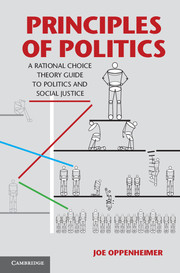Book contents
- Frontmatter
- Contents
- Propositions and Corollaries
- Tables
- Figures
- Sidebars
- Definitions
- Preface
- Overview of the Book
- Acknowledgments
- Introduction: Politics, Universals, Knowledge Claims, and Methods
- Part I The Logic of Collective Action
- Chapter 1 Voluntary Contributions and Collective Action
- Chapter 2 Going Beyond the Prisoner Dilemma
- Chapter 3 Collective Action Applications to and Beyond Democratic Politics
- Part II Collective Choice
- Part III Political Institutions and Quality Outcomes
- Part IV Social Justice, Choice, and Welfare
- Bibliography
- Name Index
- Subject Index
Chapter 3 - Collective Action Applications to and Beyond Democratic Politics
Published online by Cambridge University Press: 05 August 2012
- Frontmatter
- Contents
- Propositions and Corollaries
- Tables
- Figures
- Sidebars
- Definitions
- Preface
- Overview of the Book
- Acknowledgments
- Introduction: Politics, Universals, Knowledge Claims, and Methods
- Part I The Logic of Collective Action
- Chapter 1 Voluntary Contributions and Collective Action
- Chapter 2 Going Beyond the Prisoner Dilemma
- Chapter 3 Collective Action Applications to and Beyond Democratic Politics
- Part II Collective Choice
- Part III Political Institutions and Quality Outcomes
- Part IV Social Justice, Choice, and Welfare
- Bibliography
- Name Index
- Subject Index
Summary
Public goods are received by a group of individuals: if one gets it, so do the others. Many things such as laws, judicial appointments, and foreign policies (in general, the outcomes of political as opposed to personal decisions) can be viewed as public goods. This means that the previously reached conclusions have significant implications for how individuals relate to political and governmental outcomes. Here we use these same models to deal with relations between citizens and government. This is especially important for politics in democratic systems, where one of the objectives of the design of political institutions is to help relate citizen behavior with control and responsiveness of the government. We will show that implications of the above arguments for the behavior of citizens run counter to some traditional expectations of both the democratic public and political science professionals.
RATIONAL IGNORANCE
How do people inform themselves regarding electoral politics? Getting accurate information regarding candidates can be difficult. Information acquisition and processing about other political things (such as the goings on in a legislature, or reasoning behind judicial decisions) is likely to be even more difficult. We might say political information, and its processing, is costly.
- Type
- Chapter
- Information
- Principles of PoliticsA Rational Choice Theory Guide to Politics and Social Justice, pp. 71 - 90Publisher: Cambridge University PressPrint publication year: 2012



